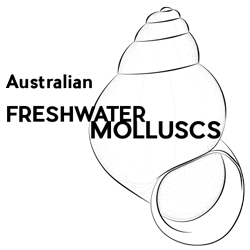
This species is a member of the B. launcestonensis group which are of medium size for the genus (2-4.2 mm in length), and rather globular. Their penis is simple. Found in the mid-north and north-eastern parts of Tasmania.
This species differs from other members of this group in its narrower radula, and a male genital system with banana-shaped prostate gland and penis with short, slightly swollen distal end (similar, but not swollen, in B. kershawi).
Beddomeia krybetes Ponder & Clark, 1993
Class Gastropoda
Infraclass Caenogastropoda
Order Littorinida
Suborder Rissoidina
Superfamily Truncatelloidea
Family Beddomeiidae
Original name: Beddomeia krybetes Ponder & Clark, 1993. In Ponder, W.F., Clark, G.A., Miller, A.C. & Toluzzi, A. (1993). On a major radiation of freshwater snails in Tasmania and eastern Victoria: a preliminary overview of the Beddomeia group (Mollusca: Gastropoda: Hydrobiidae). Invertebrate Taxonomy 7: 501-750.
Type locality: 5 km E of Royal George, on Merrywood Rd, Tasmania.
Under large stones and rock slabs in deeper parts of the river. The white egg capsules are laid on the undersides of rocks and are like those of other species of Beddomeia - dome-shaped, with broad attachment base, covered with minute, mainly white sand grains and other fragments and containing a single egg. Development direct.
This species is only known from two localities in the St Pauls River, a tributary of the South Esk River, one in the township and the second about 5 km upstream. Searches downstream and in tributaries have failed to find it (Karen Richards, pers. comm.). The species occurs with two species of Austropyrgus.
All species of Beddomeia are geographically isolated and have restricted ranges.
This species is on the Tasmanian Threatened Species Protection Act 1995 as Vulnerable.
Ponder, W. F., Clark, G. A., Miller, A. C. & Toluzzi, A. (1993). On a major radiation of freshwater snails in Tasmania and eastern Victoria: a preliminary overview of the Beddomeia group (Mollusca: Gastropoda: Hydrobiidae). Invertebrate Taxonomy 7: 501-750.